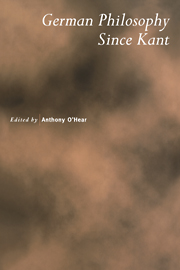Book contents
- Frontmatter
- Contents
- Preface
- Notes on Contributors
- Fichte and Schelling
- Hegel's Critique of Foundationalism in the ‘Doctrine of Essence’
- Schopenhauer's Pessimism
- Karl Marx
- Nietzsche's Virtues: A Personal Inquiry
- Bolzano, Brentano and Meinong: Three Austrian Realists
- Vorsprung durch Logik: The German Analytic Tradition
- German Philosophy of Mathematics from Gauss to Hilbert
- The Revolution of Moore and Russell: A Very British Coup?
- Husserl's Concept of Being: From Phenomenology to Metaphysics
- Frege and the Later Wittgenstein
- Otto Neurath, the Vienna Circle and the Austrian Tradition
- Does the Nothing Noth?
- Reactionary Modernism
- Adorno on Disenchantment: The Scepticism of Enlightened Reason
- Habermas, Science and Modernity
- German Philosophy Today: Between Idealism, Romanticism, and Pragmatism
- The Career of Aesthetics in German Thinking
- Hermeneutic and Analytic Philosophy. Two Complementary Versions of the Linguistic Turn?
- Index of Names
German Philosophy Today: Between Idealism, Romanticism, and Pragmatism
Published online by Cambridge University Press: 29 September 2009
- Frontmatter
- Contents
- Preface
- Notes on Contributors
- Fichte and Schelling
- Hegel's Critique of Foundationalism in the ‘Doctrine of Essence’
- Schopenhauer's Pessimism
- Karl Marx
- Nietzsche's Virtues: A Personal Inquiry
- Bolzano, Brentano and Meinong: Three Austrian Realists
- Vorsprung durch Logik: The German Analytic Tradition
- German Philosophy of Mathematics from Gauss to Hilbert
- The Revolution of Moore and Russell: A Very British Coup?
- Husserl's Concept of Being: From Phenomenology to Metaphysics
- Frege and the Later Wittgenstein
- Otto Neurath, the Vienna Circle and the Austrian Tradition
- Does the Nothing Noth?
- Reactionary Modernism
- Adorno on Disenchantment: The Scepticism of Enlightened Reason
- Habermas, Science and Modernity
- German Philosophy Today: Between Idealism, Romanticism, and Pragmatism
- The Career of Aesthetics in German Thinking
- Hermeneutic and Analytic Philosophy. Two Complementary Versions of the Linguistic Turn?
- Index of Names
Summary
History and philosophy
In his essay On the History of Religion and Philosophy in Germany, of 1834, Heinrich Heine suggested to his French audience that the German propensity for ‘metaphysical abstractions’ had led many people to condemn philosophy for its failure to have a practical effect, Germany having only had its revolution in thought, while France had its in reality. Heine, albeit somewhat ironically, refuses to join those who condemn philosophy: ‘German philosophy is an important matter, which concerns the whole of humanity, and only the last grandchildren will be able to judge whether we should be blamed or praised for working out our philosophy before our revolution.’ He then makes the following prognosis:
the German revolution will not be more mild and more gentle because it was preceded by Kantian critique, Fichtean transcendental idealism and even philosophy of nature. Revolutionary forces have developed via these doctrines which are just waiting for the day when they can break out and fill the world with horror and admiration. … Don't smile at my advice, the advice of a dreamer who warns you about Kantians, Fichteans and philosophers of nature. Don't smile at the fantast who expects the same revolution in the realm of appearance as took place in the realm of spirit.
- Type
- Chapter
- Information
- German Philosophy since Kant , pp. 357 - 398Publisher: Cambridge University PressPrint publication year: 1999
- 1
- Cited by

